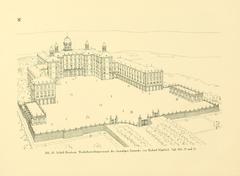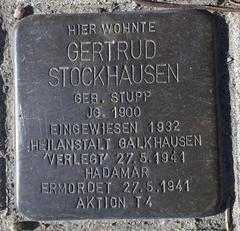
Schloss Lerbach Visiting Hours, Tickets, and Bergisch Gladbach Historical Sites Guide
Date: 04/07/2025
Introduction
Schloss Lerbach, nestled in the scenic Sand district of Bergisch Gladbach just east of Cologne, is an architectural masterpiece and a living testament to centuries of German culture and history. Once a medieval water castle dating back to 1384, the estate has evolved through noble ownership, 19th-century reinvention, and 20th-century cultural transformation. Today, Schloss Lerbach is undergoing a sustainable revitalization, preparing to reopen its historic park and expand its facilities as a modern hotel and cultural venue, with a strong commitment to near CO₂-neutral operations.
This comprehensive guide covers everything you need to know for your visit—current and upcoming visiting hours, ticketing options, accessibility, travel tips, and highlights of the estate’s history and surroundings. Whether you’re drawn by the estate’s English country house charm, the sprawling 26-hectare park, or the promise of gourmet dining rooted in Michelin-starred tradition, Schloss Lerbach offers an immersive journey through time and nature.
For the latest updates on visiting hours, tickets, and events, consult the official Schloss Lerbach website and Bergisch Gladbach’s local news (Bürgerportal Bergisch Gladbach). Enhance your visit with the Audiala app, featuring immersive audio-guided tours and exclusive content about Schloss Lerbach and the region’s historical sites.
Table of Contents
- Welcome to Schloss Lerbach: A Historical Gem
- Historical Overview
- Architectural Features and Park
- Visiting Schloss Lerbach: Practical Information
- FAQ
- Community and Cultural Significance
- Nearby Attractions
- Conclusion
- References
Welcome to Schloss Lerbach: A Historical Gem
Set amid rolling hills and mature woodland, Schloss Lerbach invites you to explore its blend of medieval heritage, elegant 19th-century architecture, and serene English landscape gardens. This guide provides essential information to help you plan your visit and fully appreciate one of Bergisch Gladbach’s most treasured landmarks.
Historical Overview
Medieval Origins and Noble Lineages
Schloss Lerbach’s earliest mention dates to 1384 as a knight’s estate owned by Johann von Hoenen. The estate’s name reflects its natural setting—the “rock stream”—and over centuries, it passed through noble families such as the von Forstbachs, von Steinens, and von Leers. By the 17th century, the original fortress had transitioned into a moated manor, and by the 19th century, it had become a central part of the local economy, including the construction of the Lerbacher Mühle (mill) in 1806 (in-gl.de).
19th-Century Transformation
In 1893, Richard Zanders and his wife Anna, daughter of industrialist Werner von Siemens, acquired the estate. The original manor was demolished, and a new, English country house-style mansion was constructed, designed by Ludwig Bopp and Gabriel von Seidl. The surrounding park was transformed into a 26-hectare English landscape garden, merging with adjacent woodland (in-gl.de).
20th-Century Adaptation and Cultural Roles
During World War II, Schloss Lerbach served as a hospital ward and later as a rest home for Belgian officers. Postwar, it became a hotel, spa, and educational center (Europäische Akademie Lerbach), later gaining renown as a Michelin-starred hotel and restaurant. Its use as a filming location and cultural venue cemented its place in the region’s collective memory (in-gl.de).
Monument Protection and Restoration
Schloss Lerbach and its park have been protected monuments since 1987, recognized for their architectural, historical, and landscape value. Restoration efforts focus on preserving original elements—windows, doors, stucco, parquet—while integrating modern sustainability standards (hogapage.de, tageskarte.io).
Recent Developments and Future Prospects
Since 2023, the Reißdorf family has led a revitalization project to restore Schloss Lerbach and expand its hospitality offerings. Plans include doubling hotel capacity, adding new dining options, and operating with near CO₂-neutral practices. The park is scheduled to reopen to the public in 2026, with the hotel reopening as a Dorint Hotel soon after (Bürgerportal Bergisch Gladbach).
Architectural Features and Park
Schloss Lerbach’s main building exemplifies late 19th-century English country house architecture, characterized by picturesque asymmetry, local greywacke masonry, a stately tower, and original ornamental details. The manor’s ivy-clad façade and the integration of outbuildings evoke timeless refinement (charmingsmallhotels.co.uk).
The 26-hectare park, designed as an English landscape garden, features sweeping lawns, mature trees, a tranquil lake, and winding paths. Restoration overseen by landscape architect Pip Morrison emphasizes ecological diversity and historical authenticity (tageskarte.io).
Visiting Schloss Lerbach: Practical Information
Hours and Tickets
- Park Opening: Scheduled for spring 2026. Check the official website for updates.
- Admission: Park entry is anticipated to be free; tickets required for guided tours, exhibitions, and special events.
- Hotel & Restaurant: The Dorint Hotel is set to open in 2026/2027, with restaurant and bar access for both guests and visitors.
Accessibility and Facilities
- Wheelchair-accessible paths throughout the park and main public areas.
- Assistance and accessible restrooms available; contact the visitor center for personalized support.
- Parking will be available, including a new underground garage.
Getting There
- By Car: 25 minutes from Cologne, with signage from major roads.
- By Public Transport: Trains to Bergisch Gladbach station, then bus or taxi to the estate.
- Detailed travel info and maps are available on local tourism websites.
Dining and Culinary Experiences
Schloss Lerbach’s restaurant has a celebrated history of Michelin-starred cuisine, offering refined regional and international dishes. The new culinary concept will include a main restaurant, bar with terrace, bistro, wine cellar, and spaces for cooking classes. Reservations are recommended, especially for weekends and events.
Art, Culture, and Special Events
The estate regularly hosts art exhibitions, classical concerts, and seasonal festivals. The park and castle interiors provide atmospheric venues for cultural activities. Check the official website or local listings for current events and guided tour schedules.
Photography and Visitor Tips
- Photography is permitted in the park and most public areas; restrictions may apply during private events.
- The park is beautiful in all seasons; wear comfortable shoes for exploring.
- Smart casual attire is recommended for dining in the restaurant.
Frequently Asked Questions (FAQ)
Q: When does Schloss Lerbach reopen to the public?
A: The park is scheduled to open in spring 2026, with the hotel and culinary venues following later that year.
Q: Are tickets required for entry?
A: Park entry will generally be free; tickets are needed for tours and events.
Q: Is the castle accessible for visitors with disabilities?
A: Yes, accessible paths and facilities are in place; contact ahead for specific needs.
Q: Can I visit the castle’s interiors?
A: Guided tours and public spaces will be accessible upon reopening. Overnight stays resume when the hotel reopens.
Q: Are pets allowed?
A: Pets on leashes are permitted in the park, but not in interior spaces.
Community and Cultural Significance
Schloss Lerbach is not only a historical monument but a beloved community landmark. Its park is cherished as a “green monument” and a gathering place, with the reopening seen as a major cultural event for Bergisch Gladbach residents (Bürgerportal Bergisch Gladbach).
Nearby Attractions
Enhance your visit with nearby sites:
- Schloss Bensberg: Baroque palace with panoramic views and fine dining.
- Papiermühle Alte Dombach: Museum of papermaking history.
- Katterbach Valley: Nature reserve ideal for hiking and picnics.
More suggestions can be found at Triplyzer and Places and Things To Do.
Visuals and Virtual Tours
Explore Schloss Lerbach online through 360-degree panoramic tours, photos, and interactive maps on the official website. These resources provide insights into the estate’s architecture, gardens, and planned developments.
Conclusion
Schloss Lerbach is poised to reemerge as a premier destination for history, culture, nature, and gastronomy in Bergisch Gladbach. Its careful restoration balances heritage preservation with sustainability and modern hospitality. Whether you come for a tranquil park stroll, an immersive guided tour, or a gourmet meal, Schloss Lerbach promises a memorable experience.
Stay updated via the official website, follow on social media, and download the Audiala app for audio tours and exclusive content. Plan your visit and rediscover the legacy of Schloss Lerbach—Bergisch Gladbach’s historical jewel.
References
- Schloss Lerbach Official Website
- Bürgerportal Bergisch Gladbach
- in-gl.de: Die Geschichte vom Rittergut zum 3-Sterne-Restaurant
- charmingsmallhotels.co.uk - Schlosshotel Lerbach
- hogapage.de - Denkmalgerechte Wiederbelebung
- tageskarte.io - Denkmalschutz und Hotelprojekt
- Triplyzer - Things to do in Bergisch Gladbach
- Places and Things To Do - Gladbach Sightseeings


